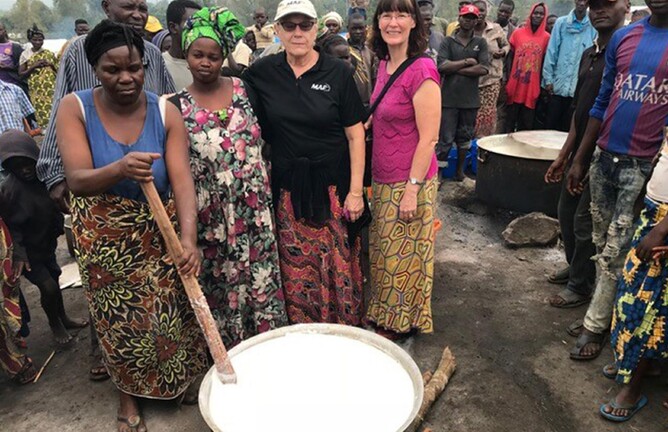A visit to a refugee camp in the Democratic Republic of the Congo (DRC).
When we arrived at the Internally Displaced Persons (IDP) refugee camp in Bunia we parked on the side of the road and got out into sewage. Apparently there was a ditch right next to the road and when it got full they just shoveled the sewage out and spread it on the road. I'm not too bothered by dirt, but it is hard to believe everyone isn't repelled by such smells. The entire time we were waiting there was a crowd watching us from the other side of the ditch. The people in the camp are from very small villages and many, especially the kids, may not have seen mzungus before.
Crossing the ditch we walked through a small covered entry area filled with seated women and babies. We were told that they had slept there the previous night to be out of the rain. They were very pleasant and friendly.
We walked along the pathways through the camp and greeted people. The tarp tents are very small. Very. About half the length of each tarp cannot be used as cover overhead since it is folded in at the ends in order for the tents to be closed. There is very little space between the sides of the tents, sometimes as little as 18 inches I would say, and the refugee residents themselves have made channels between the tents so that rainwater runoff is directed away from the living areas and downhill in a somewhat controlled manner.
We learned that there is some sort of UN standard for refugee camps which dictates how much space must be between all sides of tents. Of course that can only apply effectively to camps which are provided for people, rather than erected by them. There are also standards for how many people per toilet facility and water source. MSF and Solidarite put in toilets and water taps weeks ago but, since the number of refugees has increased exponentially day by day, I don't see how they can be keeping up with the standard. I do know that the camp has been divided and thousands are now down the hill at another camp run by CARITAS, a Catholic aid organization.
The camp itself was actually cleaner than I expected it to be. Of course when you have nothing you don't produce much garbage, do you?
Perhaps the thing that favorably impressed me most was the cooking for and feeding of thousands of people that is done as a ministry by a handful of volunteer Congolese Christian women. They have been doing this for seven weeks now. Seven weeks of being away from their own families and their needs. Bisoki told me of their sacrifice and what a strain it is becoming for them. Several of the local churches are hosting hundreds of people in the homes of their members.
The amount of food, and the wood for fires to cook it, is impressive. Some of the money MAF Disaster Response provided was used to buy a 300 liter pot. Picture a pot that holds one and a half 55 gallon drums of porridge or beans or rice! The day I visited we bought and delivered wood, tarps, plates, cups and thirty 25 kg bags (1,650 pounds) of rice. It, and all of the other food stores in the supply depot, as well as the wood for cooking, were gone by Thursday night. Not stolen or wasted, but used.
When we went to the market and to buy 100 tarps it wasn't a straight forward matter. The person we bought them from didn't have that many on the spot in the market, but had to send someone to a warehouse on foot to get them and carry them, ten at a time, back to us. After we had been waiting in the sun for at least a half hour, I asked why we couldn't just drive to the warehouse and get them all at once. I was told that the location of the warehouse was "a secret". Getting and delivering all the supplies needed for the refugees is a huge job. I so admire the MAF men who are working so hard to do this. And all in addition to their other jobs and responsibilities.
I noticed so many really young toddlers who were walking all over the place alone. I wondered how they ever found their way back to their particular tarp tents. One little one, not more than a year old, was standing right out beside the road crying and crying and no one was reacting except that one girl, about three years old, who came up and took his hand for a moment and then disappeared again. I wanted to go pick him up and comfort him, but then I remembered all the babies I have seen who will scream if a white person gets near them, and I decided my good intentions might make him more upset.
One old woman I met at the wounded people's area had machete wounds on both arms and her head. She sat unmoving and unresponsive, as though nothing could overcome her loss and sorrow. I am left wondering why I have been so blessed when she, and so many others, have suffered so much.
All in all, I came away from the experience feeling pretty useless and inadequate. The need is so great and, as almost none of the refugees speak Swahili, I was limited to smiling and reaching out to touch people to show them I care. But now I can see their faces as I pray.
Story by Cher Cadd
